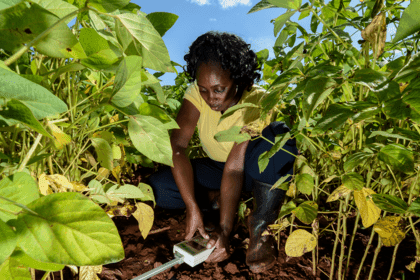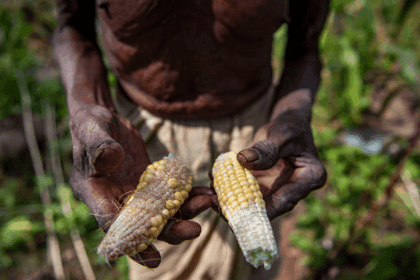
Julia Gillard speaks in Glasgow during COP26
Climate change is ‘one of the most urgent health challenges facing us all’ – Julia Gillard, chair of Wellcome, speaks in Glasgow during COP26.
Speaking at a World Health Organization conference in Glasgow on Saturday 6 November, Julia Gillard, chair of the Wellcome Trust and a former prime minister of Australia, said that climate change is one of the biggest health challenges the world is facing.
While often thought of as an environmental issue, she said the human health consequences of climate change are being felt around the world already.
Ms Gillard was delivering the keynote address at the World Health Organization’s Global Conference on Health and Climate Change, which took place alongside COP26 in Glasgow.
Full text of speech
My thanks to the World Health Organization for convening this discussion. It is both timely and necessary, as evidence continues to mount about the ways in which climate affects people’s health.
The scale of the challenge is on a par with the Covid-19 pandemic – and will far outstrip it, without concerted global action. And there are lessons we must learn from the pandemic in our response to climate change as well, in which the WHO will of course be a vital part.
For many people here, the urgency of addressing climate change is well understood. We are used to talking about it as an environmental challenge, an economic challenge, an equity challenge. What sometimes get missed is that climate change is also one of the most urgent health challenges facing us all today.
Heat, drought, fires, floods and storms. Every year that the global temperature rises, these emergency events will become more severe and more frequent.
Beyond the direct effects of a heat wave or a typhoon, there are more insidious, indirect effects. It will become difficult to grow enough fruit and vegetables for the world as temperatures rise and climates change. That means more malnutrition, famine; more tensions around land and territory.
As sea levels rise, drinking water supplies in low-lying areas are already becoming contaminated with salt. More salt means higher blood pressure and increased risks of heart conditions, pre-eclampsia and premature births. Less fresh water to drink means higher risks of chronic dehydration and spread of infectious diseases.
Scientists don’t yet understand all of the many ways in which climate change is already affecting our health. But we do not need to know everything, before we start to act. We know enough to make better decisions today.
We know that the impact on people’s health should be one of the biggest motivations to act on climate change, as well as being a factor in how we choose to solve it.
We know that gathering more evidence will lead to better solutions. We know that discoveries from the frontiers of science could also open up new approaches, and that we must be ready to recognise and apply new possibilities.
And we know that listening to people who are experiencing the health impacts of climate change, and those using the evidence to reduce those impacts, will help us all to address this challenge in the most meaningful ways.
Today, a farmer’s fields in the US are parched under the sun – the driest the farmer’s known – the driest in 45 years, her father tells her. She fears more fires; less water.
Tonight, a mother in Ghana will be wondering whether she has to stay up all night again, fanning her two boys so they can sleep in unprecedented temperatures, drying the sweat off their bodies.
In Bangladesh, a river that used to provide fish and fresh water, now runs with sewage, leeches, snakes. It’s being pushed into homes by rising sea levels; it’s rising under the bed where a child sits, marooned, because it’s not safe to wade through that water. She can’t go out and play.
The health of communities around the world is suffering. People are suffering, because of climate change.
The choice is not whether to act, but when.
In some countries, leaders have seen these local effects. They’ve seen what’s coming, and they’re taking action, not least by integrating health into their national climate plans, and doing so with ambitions of meeting the 2 degree limit set by the Paris Agreement. Countries like Costa Rica, Morocco, Cambodia, to name just three.
Other countries need to catch up. Fast. The longer we wait, the worse it will be.
What’s missing right now, is full coordination at the global level. The WHO and the Global Climate and Health Alliance have made pioneering efforts to forge an inclusive, global, climate and health movement that links NGOs, researchers and decision makers across society.
The more people and organisations who join them, the faster it will grow and the more impact it will have.
Because we can rise to meet the challenges of climate change together, if every action we take is part of a greater whole.
That’s why the world urgently needs a global strategy on climate and health.
Climate change is not a pandemic, but there are enough parallels that we should think of it like one.
As with a pandemic, the later you start, the harder you have to work to bring it under control.
As with a pandemic, you need to keep acting quickly, to stay ahead of the trajectory. It will affect some communities before others, and some communities worse than others – we will see the same health inequities exacerbated by the effects of climate change that we have seen during the pandemic – but it won’t be long before the entire population of the world is affected, directly or indirectly.
And as with a pandemic, science can find solutions, but not on its own.
We’ve seen over the past two years how the worlds of science, medicine, government and business, have come together to find solutions to the Covid19 crisis. The speed and ingenuity with which vaccines have been developed is breath-taking. The sharing of knowledge about the virus and how effective different responses are, has been heartening.
But we’ve also seen how narrow national self-interest and our global socioeconomic structures can limit access to affordable solutions everywhere they are needed, and how this prolongs the crisis instead of solving it, with people’s lives the cost.
A global strategy for climate and health can help to ensure that lessons from the successes, and the mistakes of the pandemic, are used in our response to climate change.
The difference between climate change and a pandemic, is time. Climate change is slower; its effects are not as straightforward to recognise. Slower doesn’t mean any less urgent. It means that much of our response will take longer to have an effect.
Time is not on our side. But science is.
Six months ago, I became Chair of the Wellcome Trust, a 40-billion-dollar foundation based in London, UK, supporting science to solve health challenges.
Because climate change is one of the most urgent health challenges facing us all, Wellcome is using its scientific grounding and independence, to support the role of science in addressing the impacts of climate change, focusing on health.
We have already played a similar role in the global response to the Covid pandemic – acting at the intersection of politics and health, working with the WHO and others, to support urgently needed research, and to advocate for science to drive action.
Lots of research relevant to climate and health is being done already, but not all of it is being applied to climate and health, while there are many areas of investigation where we need more research to happen.
Over the next five years, and in the decades that follow, Wellcome will play its part in the global response to the health challenges of climate change.
We’ll start by funding new research that pulls together, and builds on what is already known, across many different fields, in order to bring home to everyone the facts of just how much climate change will impact – is already impacting – human health.
Wellcome will also be gathering evidence for the health benefits or harms of different mitigation and adaptation approaches, and making that evidence an essential factor in decisions about climate change.
And we will be bringing together people with diverse experiences of climate and health, from around the world, to support and speed the growth of a collaborative climate and health community. A community that generates, values, and uses the best scientific evidence to act on climate change and improve health at the same time.
Because unless we start to see climate change as a health challenge, we won’t avoid some of its worst effects… and then climate change could become the biggest health challenge that humanity has ever faced.
It’s a frightening prospect.
But we can change this future.
If we commit to developing our shared vision of a healthy sustainable future, a world in which we can all live healthy lives on a healthy planet.
And we could start right now. Think ahead to COP27: imagine the progress we could make by then, towards a global strategy on climate and health. It won’t be easy, but the pandemic has shown us that the world can act together, quickly, to meet a challenge we’re facing together. And the pandemic has also shown us where the weak points are, that need to be addressed.
One difficulty will be securing a mandate to act across climate and health at a global level. That alone will need collective action; global ambition. We will all have to be open to new ways of working. Not constrained by the way the world works today – instead, reaching for new ways of getting things done, of making sure commitments are honoured.
It will take leadership and engagement right across society, all around the world. Science, medicine, business, governments, NGOs, and communities. United again by a common threat.
If we can do that, then we will be able to create that healthy sustainable future, for generations to come.
Thank you.
